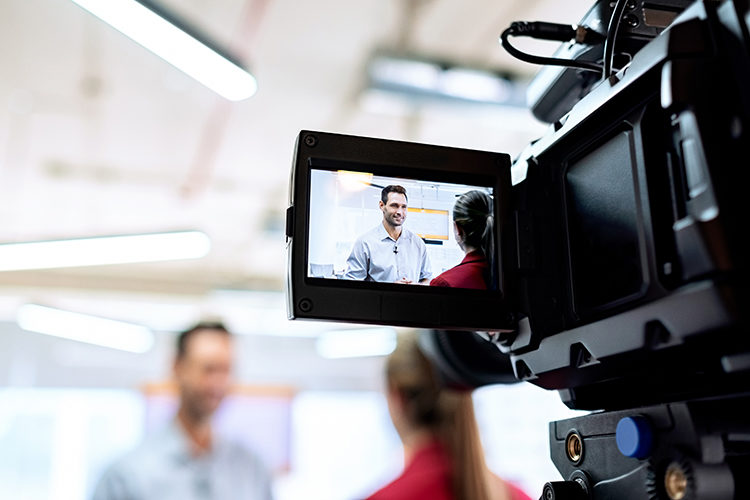Make Your Best Impression
Every media interview is an opportunity to tell your company’s story and sell your service expertise to a wider audience.

Your local television station calls your plumbing company with the opportunity to go on camera to discuss how to prevent freezing pipes. You’re excited about the opportunity, but if you’ve never been interviewed on camera, you may not be as polished as you’d like. This is why every business owner or spokesperson should be trained in how to handle a media interview. After all, every interview is an opportunity to tell your story and sell your service experts to a wider audience.
Media Training Matters
When you see a competitor being interviewed by your local news media, chances are a public relations company pitched this story to the news outlet. And you can be certain that the PR team coached the interviewee before the cameras appeared on the scene.
However, whether the story has been pitched or is a result of an organic event — such as a cold weather snap causing frozen pipes — the fact is that if you’re called on to give your expert advice, you don’t want to squander the opportunity.
Media training is a key step for any home service business owner or other staff who may be asked to speak on behalf of the company. The goal is that this high-level media training will allow your team to feel comfortable on camera and know how to demonstrate their expertise in a positive manner.
With the proper training, you may even become a rock star in the home service industry in your local media market. However, even if you’d prefer to keep things low-key, getting the skills necessary to ace an interview is still a good idea.
Keep it Real
If you’ve ever watched a politician come across as wooden during an interview, you know how easy it is to fall into a trap where you sound like every word has been planned for you. That’s because it might have been.
However, there is no reason to write a script and try to remember every word. Unless you are Tom Hanks or Meryl Streep, there is no way to read a script on camera without it coming across as phony. It’s not interesting to the viewer to hear someone drone on while reciting memorized lines.
That’s not to say you shouldn’t jot down some points you want to make during your interview. You absolutely should take the time to prepare for the interview by making some notes, but you want your points to come across in a conversational manner.
Use the skills you’ve learned in building your business to help you plan for your interview. You’ve probably had years of experience talking with customers, employees and other stakeholders.
Don’t Pop Your Gum
We’ve all seen witnesses to a car crash interviewed on our local news stations. Often, they fidget, pop their gum and twirl their hair. You must avoid these nervous symptoms once you get on camera.
These witnesses, fortunately, aren’t trying to make a good impression on potential customers, but you are. You’ve been allowed to present yourself as an expert on a home service topic, and you shouldn’t take away from your professionalism by making the unforced error of gnashing on a big wad of gum during your interview.
Make sure you dress professionally, too. Most plumbers or HVAC technicians aren’t running around the office dressed in suits and ties, so wearing one might make you look like a fish out of water. The best outfit is a clean polo or button-up shirt with your company’s logo prominently displayed on your chest.
Avoid sunglasses and flashy jewelry; these items can make you seem aloof or out of touch. People want to see your eyes so they can assess your trustworthiness.
Tell Your Story
While it’s always a good idea to answer an interviewer’s question directly, you should learn how to turn a question into an opportunity to tell the audience what you do and don’t do.
You want to be seen as friendly and available to help, but remember, this is a professional conversation. You are not chatting with a friend over burgers.
You also want to let viewers know what sets you apart from your competition. If your great-grandfather started your plumbing company at the turn of the last century, you should always emphasize your company’s longevity by sharing its history. Merely stating that you’ve been in business for 100 years doesn’t tell the viewer who your company is and what it’s about.
One way to keep the conversation on track is by using a few bridging words or phrases to lead the interviewer back to the message you want to deliver. If an interviewer focuses on a service you don’t provide or know as much about, you should answer by emphasizing what you know. Acknowledge the question by stating that some people may have seen that issue, but then state what it is your customers generally see.
Practice What You Preach
Another thing that can help you prepare for an on-camera interview is to practice on camera.
If you work with a PR agency, it will probably record you a few times to help you get more comfortable in front of a lens. You will also be able to see how you look and act on camera, so you’ll know the best places to make adjustments.
If you talk too long, fidget too much or use the word “um” too much, you’ll see it when you review the clip, and your PR team will help you overcome some of these missteps.
However, if your PR team is in another state and can’t be on-site with you, get a friend or trusted associate to get you on camera. Your PR team can view it from afar and let you know what you can do to improve your performance.
Make the Opportunity Count
Finally, as PR professionals, we train our clients to use the opportunity to demonstrate their expertise and to talk about their business to potential customers.
Make sure to use full sentences when speaking to the interviewer. If the interviewer asks a “yes or no” question, answer it, but provide a detailed reason. Speaking in full sentences is always a good policy so that the reporter has a full quote to use in the story.
Above all, remember that you’re the expert. The media came to you for a reason.
Most importantly, don’t relinquish your opportunity to sell yourself and your company during an interview. You want to be invited back to continue offering your expert advice; taking media training is one way to ensure that happens.





